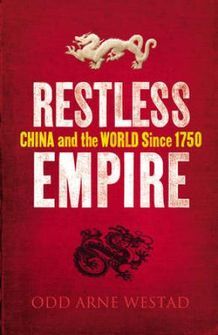By Odd Arne Westad. Grade: B+
Over the past 350 years of momentous change and dramatic upheaval, China has proved itself to be a Restless Empire. Tracing China’s course from the eighteenth-century Qing Dynasty to today’s People’s Republic, Restless Empireshows how the country’s worldview has evolved. It explains how Chinese attitudes have been determined both by receptiveness and resistance to outside influence and presents the preoccupations that have set its foreign-relations agenda.
Within two decades China is likely to depose the United States as the world’s largest economy. By then the country expects to have eradicated poverty among its population of more than one and a half billion, and established itself as the world’s technological powerhouse. Meanwhile, some – especially its neighbours – are afraid that China will strengthen its military might in order to bend others to its will. A new form of Chinese nationalism is rising. Many Chinese are angry about perceived past injustices and fear a loss of identity to commercial and foreign influences. So, will China’s attraction to world society dwindle, or will China continue to engage? Will it attempt to recreate a Sino-centric international order in Eastern Asia, or pursue a more harmonious diplomatic route? And can it overcome its lack of democracy and transparency, or are these characteristics hard-wired into the Chinese system? Whatever the case, we ignore China’s international history at our peril. Restless Empire is a magisterial and indispensible history of the most important state in world affairs today.
Restless Empire has one clear message. China is coming up in the world stage in leaps and bounds. So, it is imperative for a rational, prudent man (interested/informed in geopolitics) to know about China’s history. Why – because Chinese mindset is heavily and continuously influenced by its past.
For example, if somebody from Britain was to formulate a trade deal with China, he would have to keep in mind the fact that his country’s ancestors continually dominated the country he wants to go into trade with – and therefore is likely to be harshly dealt with or even rejected.
…After occupying Beijing, the British and French generals decided to burn Yuanmingyuan, the Gardens of Eternal Brightness that the Qianlong empire had built at the height of the Qing empire. The hundreds of palace buildings – art pavilions, pagodas, temples and libraries – burned for several days, while soldiers and officers tried to get away with as much plunder as they could…
This is a lesson for those people who think that it ideal to draw inspiration blindly from the West. Even in the Uninhabited, one could see that West has this tendency to meddle in other people’s matters to seek their own agendas. It is from Restless Empire that the lines of British journalist George Lynch come to one’s mind -
“There are things that I must not write, and that may not be printed in England, which would seem to show that this Western civilization of ours is merely a veneer over our savagery.”
As far as the technical aspects of the book are concerned, Restless Empire has a nice flow to it. The book is very informative. The best part of the book is the chronological arrangement of the sequence of events in China’s history. It begins with how China evolved as a nation through the dynastic rule and ends with the tale of an upcoming economic superpower in the modern world. There are also many cultural aspects of China that are not known to the world. For example,
In terms of copies sold, the most popular Western writer in prewar China was Sir Arthur Conan Doyle. His Sherlock Holmes stories inspired Chinese variations, notably Cheng Xiaoqing’s tales of the Shanghai master detective Huo Sang and his faithful sidekick Bao Lang. While more preoccupied with social issues than the originals, Huo and Bao are in no way inferiors in detection as they cut through the Chinese underworld of the 1920s.
While the book is an informative read for every reader, it is loaded with information specific to a particular interest group. So, if you want to know more about China, I suggest this is how you should begin.
About the author
Odd Arne Westad is one of the world’s foremost experts on both the Cold War and contemporary East Asian history, having won the Bancroft Prize, the Michael Harrington Award and the Akira Iriye International History Book Award for his seminal book The Global Cold War. A Professor of International History at the London School of Economics, he is also co-director of LSE-IDEAS, a centre for the study of international affairs, diplomacy and grand strategy.



